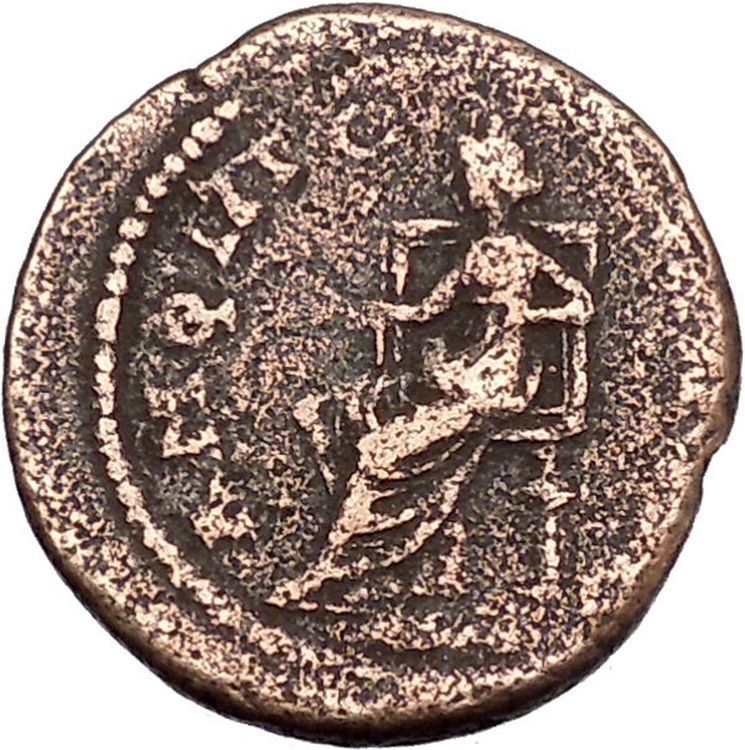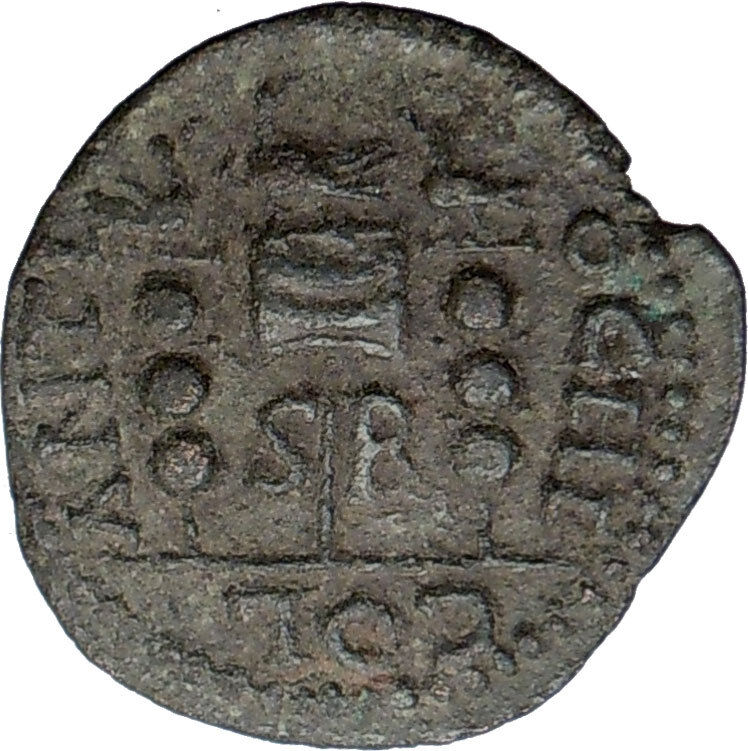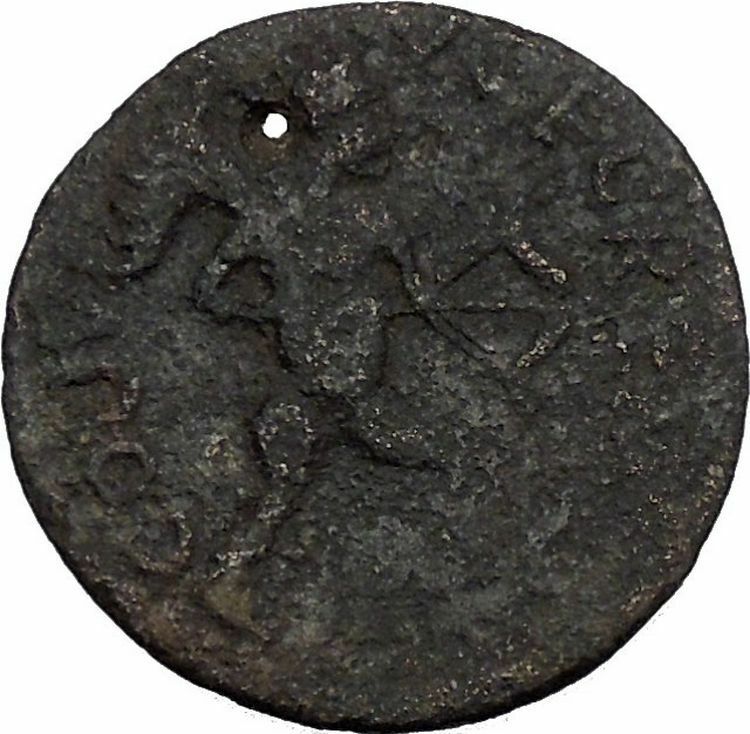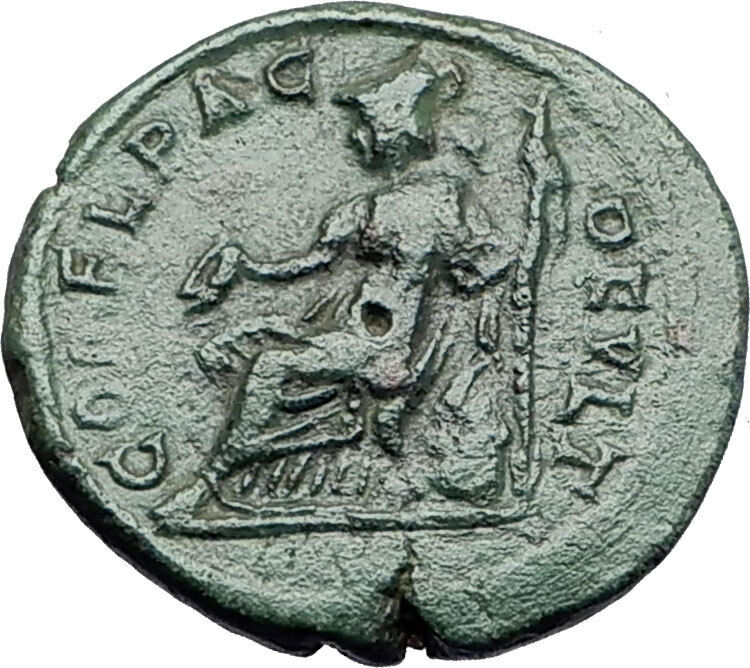|
Gordian III – Roman Emperor: 238-244 A.D.
Gordian III with Tranquillina
Bronze ‘Medallion’ 33mm (20.82 grams) of Seleukeia ad Calycadnum in Cilicia
Reference: SNG Paris 1034; Howgego 670.
M ANTΩNIOC ΓOPΔIANOC CЄ – KAICABINI – AN -TPANKVΛΛI – NAN – CЄB ; Radiate, draped and cuirassed bust right of Gordian III facing a diademed and draped bust of Tranquillina; O within ∆ COUNTERMARK.
CЄΛЄYKЄΩN TΩN ΠPOC TΩ – KAΛYK / AΔ / ЄΛЄ / VΘЄPAC • N ; Draped bust of Tyche on left wearing kalathos and cornucopia behind facing right towards draped bust of Apollo with palm branch behind on right facing left.
Expl.Künker Auction 27 (1994) No. 627.
You are bidding on the exact item pictured, provided with a Certificate of Authenticity and Lifetime Guarantee of Authenticity.
Furia Sabinia Tranquillina or Sabinia Tranquillina (ca 225 – aft. 244) was the Empress of Rome and wife of Emperor Gordian III. She was the young daughter of the Praetorian Prefect Timesitheus by an unknown wife.
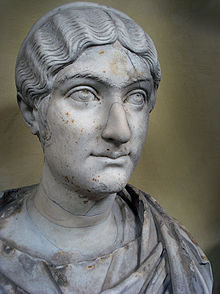 In 241 her father was appointed the head of the Praetorian Guard by the Roman Emperor Gordian III. In May that year, Tranquillina had married Gordian. She became a Roman Empress and received the honorific title of Augusta. Her marriage to Gordian was an admission by the young emperor of both political indispensability of Timesitheus and Tranquillina’s suitability as an empress. In 241 her father was appointed the head of the Praetorian Guard by the Roman Emperor Gordian III. In May that year, Tranquillina had married Gordian. She became a Roman Empress and received the honorific title of Augusta. Her marriage to Gordian was an admission by the young emperor of both political indispensability of Timesitheus and Tranquillina’s suitability as an empress.
In 243, Tranquillina’s father suddenly died and was replaced with Philip the Arab, as head of the Praetorian Guard. When Gordian was killed in February 244, Philip became the new emperor. Tranquillina survived her husband. She had no sons with him. Christian Settipani suggests that they had a daughter, (Furia) (b. ca 244), most likely posthumous, who married (Marcus Maecius Orfitus) (b. ca 245), son of Marcus Maecius Probus (b. ca 220), married to Pupiena Sextia Paulina Cethegilla (b. ca 225), paternal grandson of Marcus Pomponius Maecius Probus and maternal grandson of Marcus Pupienus Africanus (son of his protector Emperor Pupienus Maximus) and wife Cornelia Marullina, by whom she had issue.
Gordian III – Roman Emperor: 238-244 A.D.
Caesar: 238 A.D. (under Balbinus and Pupienus)
Augustus: 238-244 A.D.
| Grandson of Gordian I | Nephew of Gordian II | Adopted Successor of Balbinus and Pupienus | Husband of Tranquillina |
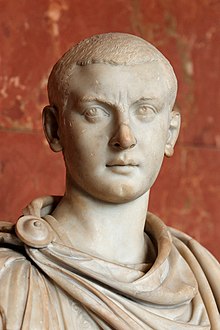
Gordian III (Latin: Marcus Antonius Gordianus Pius Augustus; 20 January 225 AD – 11 February 244 AD) was Roman Emperor from 238 AD to 244 AD. At the age of 13, he became the youngest sole legal Roman emperor throughout the existence of the united Roman Empire. Gordian was the son of Antonia Gordiana and an unnamed Roman Senator who died before 238. Antonia Gordiana was the daughter of Emperor Gordian I and younger sister of Emperor Gordian II. Very little is known of his early life before his acclamation. Gordian had assumed the name of his maternal grandfather in 238 AD.
In 235, following the murder of Emperor Alexander Severus in Moguntiacum (modern Mainz), the capital of the Roman province Germania Superior, Maximinus Thrax was acclaimed Emperor. In the following years, there was a growing opposition against Maximinus in the Roman senate and amongst the majority of the population of Rome. In 238 a rebellion broke out in the Africa Province, where Gordian’s grandfather and uncle, Gordian I and II, were proclaimed joint emperors. This revolt was suppressed within a month by Cappellianus, governor of Numidia and a loyal supporter of Maximinus Thrax. The elder Gordians died, but public opinion cherished their memory as peace-loving and literate men, victims of Maximinus’ oppression.
Meanwhile, Maximinus was on the verge of marching on Rome and the Senate elected Pupienus and Balbinus as joint emperors. These senators were not popular men and the population of Rome was still shocked by the elder Gordian’s fate, so the Senate decided to take the teenager Gordian, rename him Marcus Antonius Gordianus like his grandfather, and raise him to the rank of Caesar and imperial heir. Pupienus and Balbinus defeated Maximinus, mainly due to the defection of several legions, particularly the II Parthica, who assassinated Maximinus. However, their joint reign was doomed from the start with popular riots, military discontent and an enormous fire that consumed Rome in June 238. On July 29, Pupienus and Balbinus were killed by the Praetorian Guard and Gordian proclaimed sole emperor.
Rule
Due to Gordian’s age, the imperial government was surrendered to the aristocratic families, who controlled the affairs of Rome through the Senate. In 240, Sabinianus revolted in the African province, but the situation was quickly brought under control. In 241, Gordian was married to Furia Sabinia Tranquillina, daughter of the newly appointed praetorian prefect, Timesitheus. As chief of the Praetorian Guard and father in law of the Emperor, Timesitheus quickly became the de facto ruler of the Roman Empire.
In the 3rd century, the Roman frontiers weakened against the Germanic tribes across the Rhine and Danube, and the Sassanid Empire across the Euphrates increased its own attacks. When the Persians under Shapur I invaded Mesopotamia, the young emperor opened the doors of the Temple of Janus for the last time in Roman history, and sent a large army to the East. The Sassanids were driven back over the Euphrates and defeated in the Battle of Resaena (243). The campaign was a success and Gordian, who had joined the army, was planning an invasion of the enemy’s territory, when his father-in-law died in unclear circumstances. Without Timesitheus, the campaign, and the Emperor’s security, were at risk.
Gaius Julius Priscus and, later on, his own brother Marcus Julius Philippus, also known as Philip the Arab, stepped in at this moment as the new Praetorian Prefects and the campaign proceeded. Around February 244, the Persians fought back fiercely to halt the Roman advance to Ctesiphon. Persian sources claim that a battle occurred (Battle of Misiche) near modern Fallujah (Iraq) and resulted in a major Roman defeat and the death of Gordian III. Roman sources do not mention this battle and suggest that Gordian died far away from Misiche, at Zaitha (Qalat es Salihiyah) in northern Mesopotamia. Modern scholarship does not unanimously accept this course of the events. One view holds that Gordian died at Zaitha, murdered by his frustrated army, while the role of Philip is unknown. Other scholars, such as Kettenhofen, Hartman and Winter have concluded that Gordian died in battle against the Sassanids.
Philip transferred the body of the deceased emperor to Rome and arranged for his deification. Gordian’s youth and good nature, along with the deaths of his grandfather and uncle and his own tragic fate at the hands of the enemy, earned him the lasting esteem of the Romans. The soldiers held Gordian in high esteem, as he had possibly sacrificed his life to save them in 244.
|





 In 241 her father was appointed the head of the Praetorian Guard by the Roman Emperor Gordian III. In May that year, Tranquillina had married Gordian. She became a Roman Empress and received the honorific title of Augusta. Her marriage to Gordian was an admission by the young emperor of both political indispensability of Timesitheus and Tranquillina’s suitability as an empress.
In 241 her father was appointed the head of the Praetorian Guard by the Roman Emperor Gordian III. In May that year, Tranquillina had married Gordian. She became a Roman Empress and received the honorific title of Augusta. Her marriage to Gordian was an admission by the young emperor of both political indispensability of Timesitheus and Tranquillina’s suitability as an empress.


